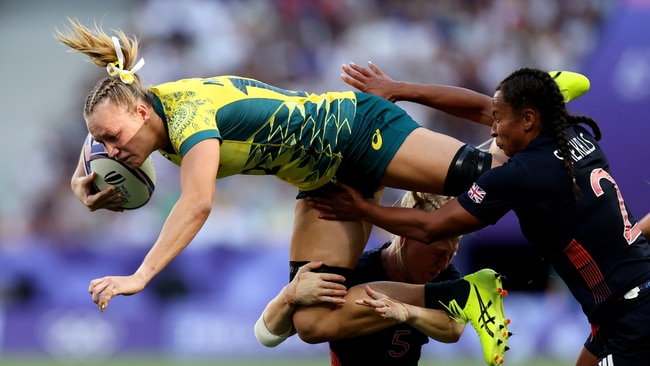Rugby Sevens star Maddison Levi on resetting after mistakes and hunting for redemption
Let the games begin

Lifestyle
Don't miss out on the headlines from Lifestyle. Followed categories will be added to My News.
The explosive try scorer is set for her second Games – so we caught up with the Sevens star ahead of her turn in Paris.
Three years of “putting in all the hours and the tears and the blood and the sweat” will make Paris 2024 even better than Maddison Levi’s debut in Tokyo.
“I think this one will be super special,” she says. The 22-year-old is a star of the in-form Rugby Sevens who are raring for redemption after a devastating quarter-final loss to Fiji in 2021. “Our mantra going into any tournament since then is we don't take any team lightly, but we take each game as it comes,” Levi says.
Now with a Commonwealth Games gold medal on their trophy shelf and a win at the recent Women's World Sevens Series in Madrid (featuring a hat trick from Levi), the team have learned a lot from their setbacks. “We're all the athletes we are because we all are our harshest critics and we all put so much pressure on ourselves,” Levi says. We spoke to the Women’s Sevens Player of the Year (who just broke the record for most tries scored by a female in a season) in the lead-up to Paris about levelling with self-doubt, moving on from mistakes and how to hone a game-winning mindset before the whistle blows.

Body+Soul: This is your second Olympics. How does this lead-up feel different to Tokyo?
Maddison Levi: It’s very different because I found out I was going to the Olympics a month before [Tokyo], I wasn't even fully contracted at that time and didn't even think I was a shot for the Olympics. So that was just a surreal moment. For a first Olympics, you probably can't beat that feeling and that sense of surprise. But I think this one's all the more better because I've gone through all three years of the training and worked my ass off, so it obviously means a whole lot more. Not that that one didn't, but this one just putting in all the hours and the tears and the blood and the sweat, I think this one will be super special.
B+S: It was obviously a tough quarterfinal in Tokyo. What has the team learned from that, and also, you personally have learned from that?
ML: Our mantra going into any tournament since then is we don't take any team lightly, but we take each game as it comes. So, just presenting and playing the game that's in front of us and not thinking too far ahead, which has helped us. At the end of the day it's not really how skillful we can be, it's how hard we want to work for the person next to us for 14 minutes, and how much we want to put our body on our line for the person next to us. It was quite devastating, that loss definitely turned everyone to work harder and work for each other.
B+S: Can you tell when someone else in the team is struggling? How do you come together as a team to recover from setbacks?
ML: Definitely. I used to be one of those people that if I dropped a ball, it was the be-all and end-all. I just sheltered in, got in my head and thought about all the negative things. I've definitely grown as a person and with the help of our psych, Michael Lloyd, he's really helped me expand my mindset. But I can see from a personal experience when someone else is going through that. So I try to get them up and about and get them out of their own head because we say, "Your biggest distraction is really you in your head." Getting each other to focus on the job at hand and what's next because at the end of the day, we are human and we are going to make mistakes, we're not perfect, but it's about what you can do next that can [have an] impact. We also say that if you make a mistake, just make sure we're learning from it and we're not just making that same mistake over and over again.
B+S: How much of the game do you think is mental?
ML: It can impact the game immensely, from the run out, before the game, it starts then. If you're not in a clear mindset, or you're thinking about things that you could stuff up, you can definitely impact the game. Because it's a team environment, if someone's down, you don't always have the time to try and help them out. It does domino effect and affects everyone. Before the game, we will try and have a fun, happy environment. We are always singing songs, laughing. Because when you’re calm and relaxed, that's when we play our best footy. So, just making sure that everyone's in that kind of head space before they run out. And have a clear mind, so then they can go out and put on all the hard work we've all just been through.
B+S: Do you have any habits before a game?
ML: I do a lot of visualising, trying to put myself in the moment. And I love an escape, so I love listening to music just to distract me from the task at hand because I tend to overthink things. If I thought too much into the game, I could get in my head sometimes. Then when I get to the game, if I feel I'm going to get nervous or if it is a big game, I just take deep calm breaths and try and centre myself and just know that I've done the work. As warm-up starts, I try and get out and get amongst the group and try to help people because then that's also another distraction. Once I've calmed myself down and cleared my mind, then if I can help other people, I think that helps me more.
B+S: Are there any songs or particular genres of music that you prefer at that time?
Maddison Levi: I'll just listen to anything that I know. I'm a little bit superstitious. So, if I listen to say three songs before we play game one and we win, then I listen to those three songs before the next game. I think in Madrid I was listening to Fix You by Coldplay. It did the job, and it calmed me down not being so over-hyped and overstimulated.
B+S: What's your perspective on pressure and expectations, particularly in a team environment?
ML:I'm excited. I know the Olympics is such a big thing, but it's only big if we amplify it. I’m trying to think – we've done all the work, so each game is exactly like the games we've just played. We spoke about Madrid probably being a tougher challenge because everyone's playing without fear. So, to get that knocked off and to come home with a win gave us a lot of confidence moving into the Olympics. We've definitely done the work, and the only pressure will be the pressure we put on ourselves. As a team, we're so united. At this level, it's just recognising when so much pressure is too much pressure. I used to be so upset if I didn't touch a ball or if I didn't score a try. At the end of the day, it's a team sport. My growth from the first season – being upset if I knocked a ball on, or if I didn't score a try – to now when I'm like, if I'm not scoring tries, I hope if the other girls are scoring tries and we're winning, that's more important to me now. I'm more upset if I don't chase someone down in a defense tackle, just thinking of the bigger picture to help the team. We've all definitely dealt with a lot of pressure and you are only more nervous if you haven't done the preparation, and I think we're well and truly prepared and we just need to go out and execute.

B+S: What kind of mindset work do you do together as a team?
ML: We did a really cool group session the other month [with our sports psychologist]. He gave us a piece of string and he said, ‘Hold it still, if you think about moving the string, your mind and your body will just move the string because you visualise it.’ We were all like, ‘Oh yeah, sure.’ And then lo and behold, we're thinking about moving the string, without even doing it, it started doing it. The main message he had then was if you think about something, your body is – nine times out of 10 – more inclined to actually complete that action.
So, if you are on the field going, "Shit, I hope I don't drop this ball. I hope I don't drop this ball." Your body thinks about the motion of dropping the ball, so then you are more inclined to drop the ball. Trying to have that positive chat and go, ‘Hang on, I'm going to catch this ball,’ and then, you’re probably more inclined to catch it.
B+S: Have you been given other advice, whether that's from coaches, or other players, or just maybe just mentors in general that have really stuck with you when it comes to mindset and your mental game?
ML: When I first started with [our sports psychologist] I struggled a lot with self-doubt, which was so funny because I had just made the Dream Team, I was nominated for a player of the year, broke the record last year. I was in his room in Dubai in tears and he was like, ‘What are you doing?’ I was like, ‘I'm just so nervous to play. I think I'm more nervous now that I feel like I have an expectation to perform because of the year I had.’ And he goes, ‘Just do everything how you normally do. If you're nervous to play other people, imagine how nervous they are to play you. They'd be more shit scared of you than you'd be scared of them.’
And then, that gave me enough confidence to go, ‘Hang on a minute. Yeah, he's right. If I just catch a ball and do the basics right, they're probably more scared of me, so I need to stop stressing and looking into the opposition.’
B+S: It’s such an intense sport, when you come off the field do you find that you need techniques to wind down?
ML: Depending on where we are in the tournament, if I can socialise, I like to go and socialise, just because I feel like we have such a big role as athletes to inspire the younger generation, so any interaction with them could be the trigger for them to play the sport. During big events or if we have a quick turnaround, I go back in feed up. Then, we as a team, we do no phones, so we can just focus on the game we've just played together. We'll go recover and ice bath together, and then, we come back in and watch the game together before we do anything else. Just so then if you have something you need to say or if you've just been thinking about something, you're not going to dwell on it, we just nip it in the bud there. Social media is so powerful, if you get on your phone, straight on social media, and see something you don't like or something else, then I think it can just change the way you think. So, just trying to be together after the game, review it together, and then go on from there.
B+S: How does it feel getting to play with your sister Teagan?
ML: It's super exciting. I remember when I made Tokyo, and Teags is not really a big crier when it comes to me, she tries to be a bit stubborn. But I called her and told her that I made it and she burst into tears and I said, "This will be you in Paris." And then, I remember just calling her every time I was over there and going, "Teags, this is the best thing ever and I can't wait to experience it with you. We play in the World Series and we play for Australia week in, week out, but this would just be even more special [to] step out for each other at the Olympics, which is considered the pinnacle of sport.
More Coverage
Originally published as Rugby Sevens star Maddison Levi on resetting after mistakes and hunting for redemption




